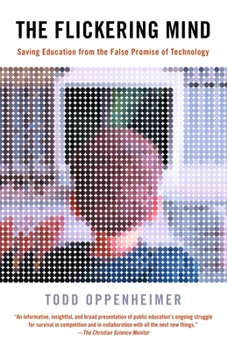The Flickering Mind: Saving Education from the False Promise of Technology
Select Format
Select Condition 
Book Overview
The Flickering Mind, by National Magazine Award winner Todd Oppenheimer, is a landmark account of the failure of technology to improve our schools and a call for renewed emphasis on what really works. American education faces an unusual moment of crisis. For decades, our schools have been beaten down by a series of curriculum fads, empty crusades for reform, and stingy funding. Now education and political leaders have offered their biggest and most expensive promise ever--the miracle of computers and the Internet--at a cost of approximately $70 billion just during the decade of the 1990s. Computer technology has become so prevalent that it is transforming nearly every corner of the academic world, from our efforts to close the gap between rich and poor, to our hopes for school reform, to our basic methods of developing the human imagination. Technology is also recasting the relationships that schools strike with the business community, changing public beliefs about the demands of tomorrow's working world, and reframing the nation's systems for researching, testing, and evaluating achievement. All this change has led to a culture of the flickering mind, and a generation teetering between two possible futures. In one, youngsters have a chance to become confident masters of the tools of their day, to better address the problems of tomorrow. Alternatively, they can become victims of commercial novelties and narrow measures of ability, underscored by misplaced faith in standardized testing. At this point, America's students can't even make a fair choice. They are an increasingly distracted lot. Their ability to reason, to listen, to feel empathy, is quite literally flickering. Computers and their attendant technologies did not cause all these problems, but they are quietly accelerating them. In this authoritative and impassioned account of the state of education in America, Todd Oppenheimer shows why it does not have to be this way. Oppenheimer visited dozens of schools nationwide--public and private, urban and rural--to present the compelling tales that frame this book. He consulted with experts, read volumes of studies, and came to strong and persuasive conclusions: that the essentials of learning have been gradually forgotten and that they matter much more than the novelties of technology. He argues that every time we computerize a science class or shut down a music program to pay for new hardware, we lose sight of what our priority should be: "enlightened basics." Broad in scope and investigative in treatment, The Flickering Mind will not only contribute to a vital public conversation about what our schools can and should be--it will define the debate.
Format:Paperback
Language:English
ISBN:0812968433
ISBN13:9780812968439
Release Date:December 2004
Publisher:Random House Group
Length:528 Pages
Weight:1.05 lbs.
Dimensions:1.1" x 5.2" x 8.0"
Customer Reviews
2 ratings
Couldn't have been better
Published by Thriftbooks.com User , 18 years ago
This was my first book purchase over the internet, and I was a bit apprehensive about doing it. However, I couldn't have been more pleased about the experience. I received the book about 2 weeks after I ordered it, it was cheaper than if I were to have bought it from my local bookstore, and it was in absolutely excellent condition. I will definitely do it again!
Thought Provoking
Published by Thriftbooks.com User , 19 years ago
In this volume, Oppenheimer takes on the blanket use of computer technology in the classroom. His basic argument is that local school boards are sinking money into technology while basics are being underfunded. Without covering the basics, children will grow up without the ability to think. To compound this problem, technology quickly becomes obsolete, which requires school systems to either use out of date equipment, or to participate in a vicious cycle which sucks funds from underfunded schools. Two other things that this book really criticized is the promotion of standardized testing and fraudulent educational software companies. This book claims that the promotion of standardized testing has encouraged teachers to use computers to practice endless test drills, but on the other hand, students are not really learning anything other than how to take tests. No one makes a living by answering multiple-choice questions. This use of standardized testing is exploited by educational software companies that use biased studies to support claims that their software increases test scores. Oppenheimer laments that education has become testing rather than learning and thinking. I believe this book raises a lot of powerful arguments. Oppenheimer isn't against using computers, but their use should be limited in scope. I really recommend that all teachers should examine this book and think critically about the role of computers in their classes.





